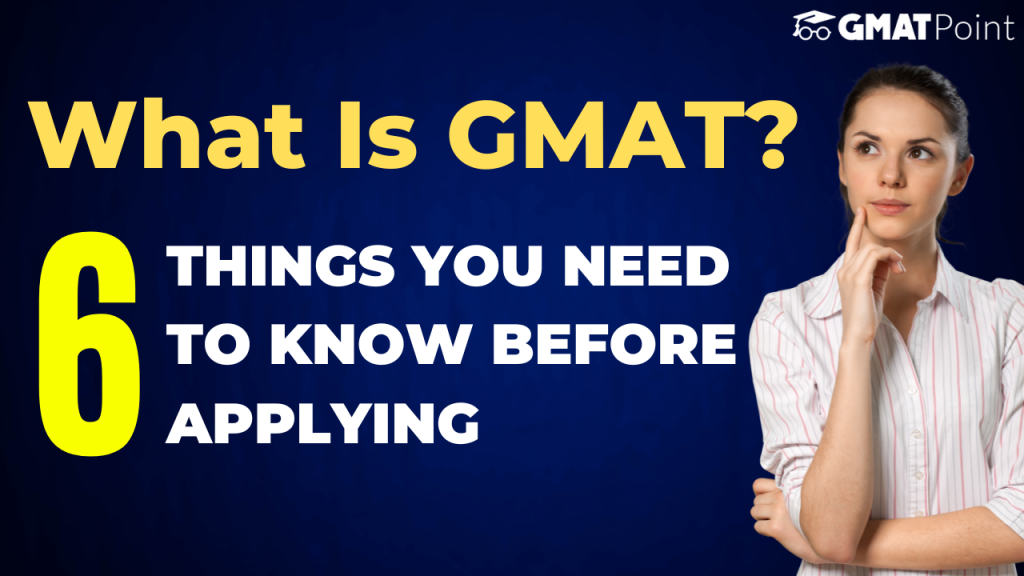6 Things You Need To Know About the GMAT Exam Before Applying
The Graduate Management Admission Test (GMAT) is a standardized test that measures a candidate’s aptitude for graduate business studies. It is a computer-adaptive test (CAT) that assesses a candidate’s skills in Quantitative Reasoning, Verbal Reasoning, Integrated Reasoning, and Analytical Writing. The GMAT exam is widely used by business schools worldwide as a critical parameter in the admission process. In this article, we will discuss what is GMAT exam and the most important 6 things you need to know about the GMAT exam before applying.
Take Free GMAT 2023 Daily Targets
Subscribe To GMAT Preparation Channel
GMAT Exam Is For What Purpose?
GMAT is widely accepted across top business schools across the world. A good GMAT score will make it easier for you to get admitted to MBA programs from premier institutes. You should definitely prepare for the GMAT if you want to pursue MBA abroad.
If you’re looking to pursue MBA from top b-schools in India, you can check out this page to learn more about the Top colleges accepting GMAT scores in India.
Hence, if you decide to pursue GMAT, Click here to see how to register for the GMAT exam.
What is GMAT Exam Pattern?
The GMAT tests you on your high school Mathematics and your proficiency in English language abilities. It can be taken at an exam centre or from home. The exam is 3 hours and 7 minutes long (excluding optional breaks). It consists of 4 sections:
- Analytical Writing Assessment (AWA): This section requires the test taker to analyze an argument and write an essay. The time limit for this section is 30 minutes.
- Integrated Reasoning (IR): This section assesses the test taker’s ability to analyze the given data and integrate information from multiple sources. It includes questions on graphics interpretation, multi-source reasoning, and table analysis. The time limit for this section is 30 minutes.
- Quantitative Reasoning: This section measures the test taker’s mathematical problem-solving and data-sufficiency skills. The time limit for this section is 62 minutes.
- Verbal Reasoning: This section measures the test taker’s ability to understand and analyze written material, reason and evaluate arguments, and correct written material to conform to standard written English. The time limit for this section is 65 minutes.
|
Sections |
Number of Questions | Sectional Duration |
| Quantitative Reasoning | 31 | 62 |
| Verbal Reasoning | 36 | 65 |
| Integrated Reasoning | 12 | 30 |
| Analytical Writing Assessment | 1 | 30 |
Check out the complete updated GMAT Syllabus.
As is evident, the two most important sections are Verbal Reasoning and Quantitative Reasoning. Both of these sections are Computer adaptive.
What is Computer Adaptive Testing?
Computer-adaptive testing is different from computer-based testing, which is a computerized version of a written test. In the former, your competence and performance in a particular question decide the difficulty of the next question you face.
The Quant and the Verbal sections start with a question of an average level of difficulty, and the next question is given based on your response to the previous question. The more number of questions you answer correctly, the more difficult the subsequent questions will be. The next question will be easier if you answer its previous question incorrectly.
What is GMAT Score?
The GMAT composite scores range from 200 to 800. Please note that only the Verbal and Quantitative sections contribute to the composite score of the GMAT. Both these sections have a score from 6 to 51, with the total GMAT score resulting from these two scores, adjusted by the computer adaptive difficulty level of the questions answered.
The analytical writing assessment scores and integrated reasoning sections are reported separately and are not included in the total GMAT score.
GMAT Attempts
You can give the GMAT 8 times, which is the lifetime limit. In a 12-month period, you can give up to 5 attempts. Between two successive attempts, there must be a gap of at least 16 days.
Your GMAT score is valid for five years. Usually, MBA programs will consider your best GMAT score out of all your valid attempts.
GMAT Free Online Resources
GMATPoint is an online platform that provides free GMAT practice tests in Verbal and Quants in the form of free daily targets. You will get five questions each in Quant and Verbal sections daily that are of the level of GMAT, which you must solve within a time limit. You will receive free video solutions to the questions and can also analyse your performance and leaderboard.
If you are preparing for GMAT, this is a tool that you need to take advantage of, as it will help you remain consistent and constantly revise all the concepts tested in the exam.
Contact us at support@gmatpoint.com if you have any further queries regarding the exam.
Here’s wishing you all the best!
Also Read:
- 6 Interesting Facts About The GMAT Exam You Should Know
- GMAT preparation for beginners: What to Study and How
- 6 Best Practices for GMAT Preparation: The Ultimate Study Guide
- How To Study For GMAT With Full-time Job?
- Can You Study for GMAT On Your Own? A Step-by-step Approach
- Is GMAT Easy To Crack? What Makes GMAT Challenging
- How to start your GMAT preparation | 5 Tips To Crack GMAT
- Top colleges accepting GMAT scores in India
If you are starting your GMAT preparation from scratch, you should definitely check out the GMATPOINT
